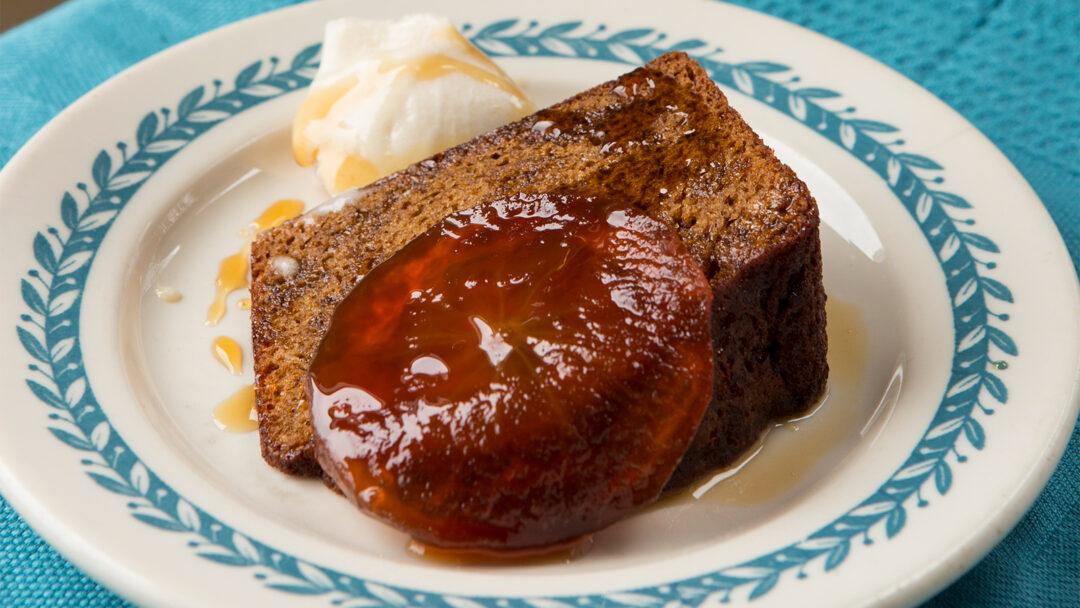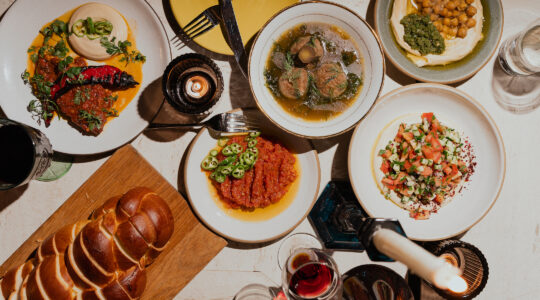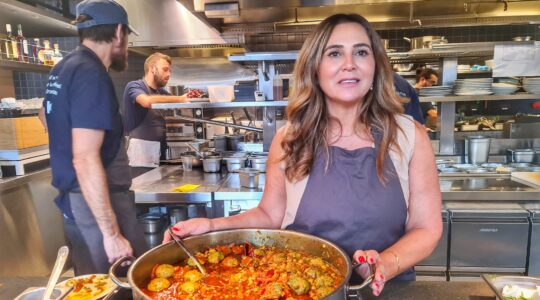This article originally appeared on The Nosher.
We asked five noted chefs and food writers what they will serve at home to mark the Jewish New Year, and (spoiler alert) they all plan to weave symbols of sweetness — hallmarks of the holiday — into their menus. Long live apples and honey!
But the apples may be in the form of a confit, and the honey might be replaced by silan (date syrup). And in place of brisket and Manischewitz, consider grilled vegetables and an aperitif.
Adeena Sussman
Israel-based food writer Adeena Sussmann, author of “Sababa,” will serve a sticky, sheet pan chicken made with honey followed by her grandmother’s honey cake. To kick off the holiday meal, her “Pomegroni” — like a Negroni, but with fresh pomegranate juice substituted for Campari. Pomegranates are in season in Israel in September, and are often incorporated into the holiday meal.

(Dan Perez)
Pomegroni
Yields: 2 cocktails
- 6 ounces (¾ cup) pomegranate juice
- 2 ounces (¼ cup) sweet white vermouth or Lillet
- 2 ounces (¼ cup) dry gin
- Generous splash Angostura bitters
- Blood orange or other orange wheels
DIRECTIONS
- In an ice-filled cocktail shaker, vigorously shake the pomegranate juice, vermouth, gin and bitters. Pour into two ice-filled rocks glasses, add more bitters to taste, and garnish with orange wheels. The recipe can be multiplied (minus the ice) and stored in a pitcher for up to one week and can be freshened with more bitters as needed.
Itamar Srulovich
London-based Itamar Srulovich — podcast host, cookbook author and co-founder of the Honey & Co. mini-empire — holds an “orphans’ Rosh Hashanah” each year with his wife and partner, Sarit Packer, for friends who don’t have a New Year celebration of their own. “One thing we never miss out on is apples and honey,” said Srulovich. The couple samples at least a dozen types of honey and several varieties of apples.
Since the holiday is early this year, Srulovich is considering a recipe for grilled pumpkin, apples and chestnuts that he discovered during his travels in Turkey, cooked on an outdoor grill (or charred in the oven).
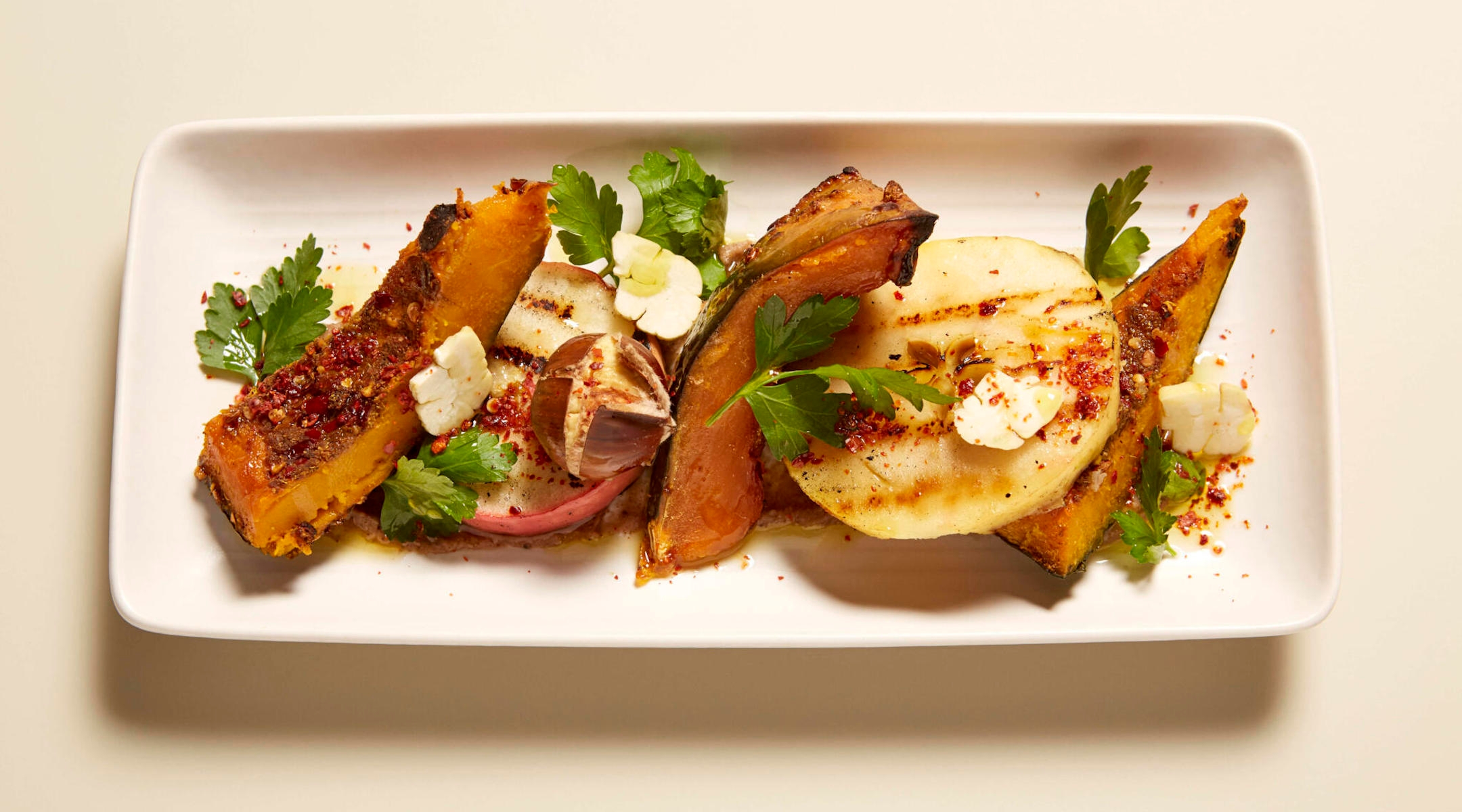
(Patricia Niven)
Grilled Pumpkins, Apples and Chestnuts
Reproduced from “Chasing Smoke: Cooking Over Fire Around the Levant” by Sarit Packer & Itamar Srulovich, (2021, Pavilion)
Serves: 4 as a starter or 6 as a side
- 1 small pumpkin or 2 small onion squash
- 2 Golden Delicious or Pink Lady apples
- 2 Tbsp olive oil
- 1 tsp sea salt
- ½ tsp freshly ground black pepper
- 12 chestnuts
- 1 head of red radicchio or red endive
For the dressing:
- juice of 1 orange
2 Tbsp cider vinegar - 2-inch piece of fresh ginger, peeled and grated
- 2 Tbsp dried barberries (or you can use dried currants)
- 1 Tbsp honey
- 2 Tbsp olive oil
DIRECTIONS
- Mix all the dressing ingredients together and set aside until you are ready to serve. If you can, make it at least one hour in advance of serving, for the best flavour.
- Cut the pumpkin into thick slices or wedges (no need to peel), remove the seeds and place on a baking tray. Slice the apples into 2-3 cm/1-inch thick rounds (cut through the core) and add to the tray. Drizzle with the olive oil and season with the sea salt and pepper. Remove from the tray and place the pumpkin and apple slices on a hot grill to char for about 3-4 minutes on each side, then return them to the oily tray.
- Slit the chestnuts carefully with a sharp knife so they don’t explode and place in a mesh tray or colander over the fire to roast. Shake the tray/colander every 30 seconds or so, till the skins crisp and start to open – about 12-14 minutes.
- Break the radicchio into separate leaves, place on a large platter and top with the slices of grilled pumpkin and apple. Peel the chestnuts and break them up, scattering the pieces all over the salad, then dress generously and serve.
- To cook without a BBQ: Roast the oiled, seasoned pumpkin in a hot oven at 220°C (430°F) for about 20 minutes, then transfer to a griddle pan over a medium-high heat to char for 3-4 minutes each side. Griddle the oiled and seasoned apples on both sides for the same length of time. Roast the chestnuts in the oven for about 10 minutes until the skins start to open, but don’t forget to score them first.
Pati Jinich
Pati Jinich, cookbook author and host of “Pati’s Mexican Table,” plans to serve her holiday meal outside at her home in Washington, D.C. This year, she hopes to try all new foods, from different parts of the world. If you, too, are looking for something different, Jinich suggests you try her Veracruz gefilte fish. With a piquant, Mexican twist, it celebrates different culinary worlds colliding, inspired by Pati’s grandmother who arrived in Mexico, at the port of Veracruz, from Poland. Serve it hot with slices of challah and pickles.
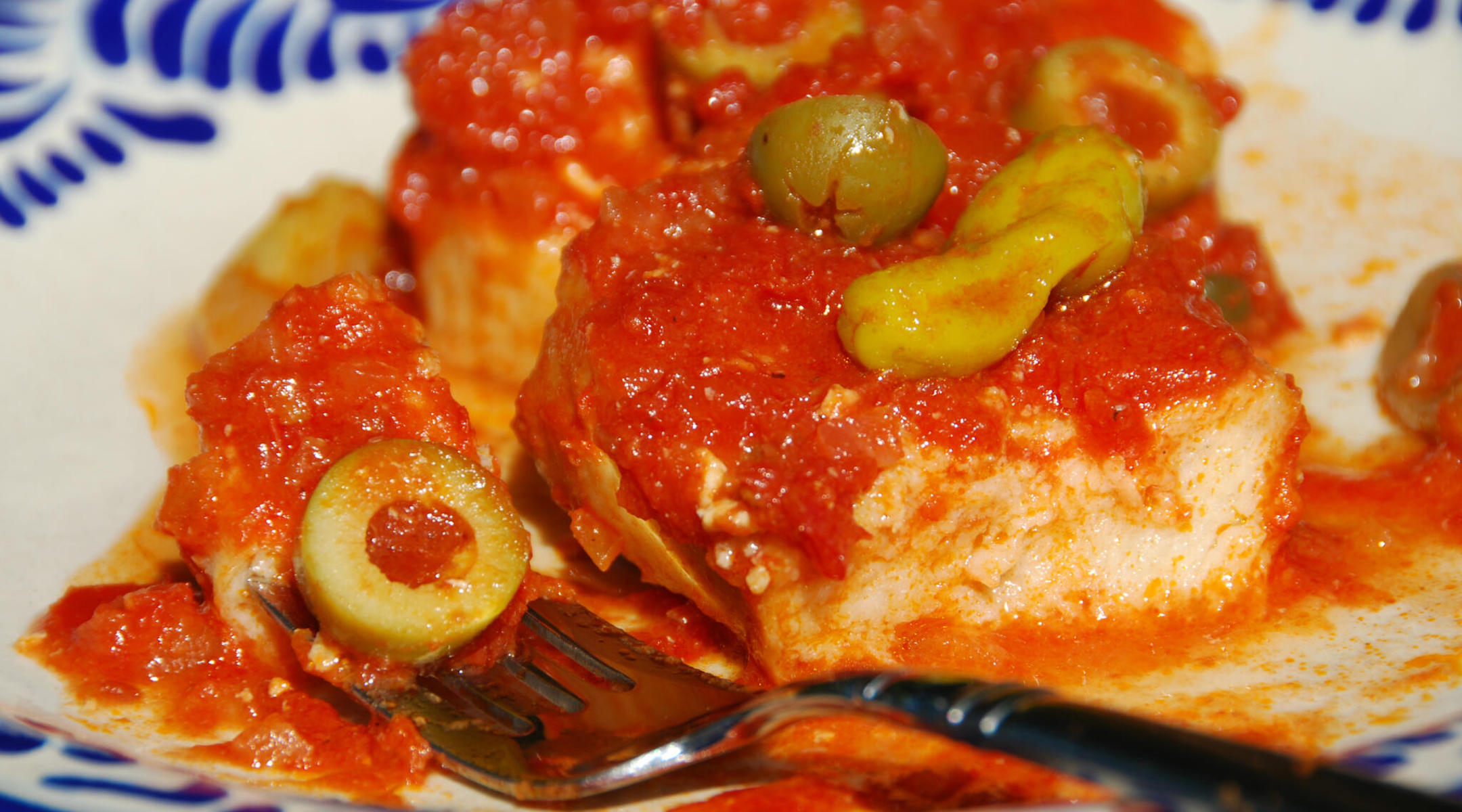
(Pati Jinich)
Mexican-Style Gefilte Fish
Yields: 20 patties
For the fish patties:
- 1 pound red snapper fillets, no skin or bones
- 1 pound flounder fillets, no skin or bones
- ½ white onion quartered, about ½ pound
- 2 carrots peeled and roughly chopped, about ¼ pound
- 3 eggs
- ½ cup matzah meal
- 2 tsp kosher or sea salt, or to taste
- ½ tsp ground white pepper, or to taste
For the red sauce:
- 3 Tbsp safflower or corn oil
- ½ cup white onion, chopped
- 1 28-ounce can crushed tomatoes
- 3 cups fish broth or water
- 2 Tbsp ketchup
- 1 tsp kosher or sea salt, or to taste
- ¼ tsp ground white pepper or to taste
- 1 cup manzanilla olives stuffed with pimientos
- 8 pepperoncini peppers in vinegar brine (chiles güeros en escabeche), or more to taste
- 2 Tbsp capers
DIRECTIONS
- To prepare the fish patty mixture: Rinse the red snapper and flounder fillets under a thin stream of cool water. Slice into smaller pieces and place in the food processor. Pulse for 5-10 seconds until fish is finely chopped but hasn’t turned into a paste. Turn fish mixture into a large mixing bowl. Then place the onion, carrots, eggs, matzo meal, salt and white pepper into same bowl of the food processor. Process until smooth and turn into the fish mixture. Combine thoroughly.
- To prepare the red sauce: Heat the oil in a large cooking pot over medium-high heat. Add the chopped onion, and let it cook for 5-6 minutes, stirring, until soft and translucent. Pour the crushed tomatoes into the pot, stir, and let the mix season and thicken for about 6 minutes. Incorporate 3 cups water, 2 tablespoons ketchup, salt and white pepper. Give it a good stir and bring to a boil. Reduce the heat to low and bring sauce to a gentle simmer. Continue to simmer while you roll the gefilte fish patties.
- Place a small bowl with lukewarm water to the side of the simmering tomato broth. Start making the patties. I like to make them about 3 inches long, 2 inches wide and 1 inch high, in oval shapes. Wet your hands as necessary, so the fish mixture will not stick to your hands. As you make them, gently slide each patty into the simmering broth. Make sure it is simmering and raise the heat to medium if necessary to keep a steady simmer.
- Once you finish making the patties, cover the pot and bring the heat to low. Cook them covered for 25 minutes. Take off the lid, incorporate the manzanilla olives, pepperoncini peppers and capers. Give it a gentle stir and simmer uncovered for 20 more minutes, so the gefilte fish will be thoroughly cooked and the broth will have seasoned and thickened nicely.
Michael Solomonov
Solomonov — chef, restaurateur and cookbook author, known for extolling and preparing Israeli food — will return to his roots this year with his Mom’s Honey Cake with Apple Confit. It’s a classic honey cake, moistened with brewed coffee and lots of honey, topped with an elegant apple confit, sweetened with honey, cloves and vanilla. The confit has savory applications, too. It’s great, he said, served with chopped liver.
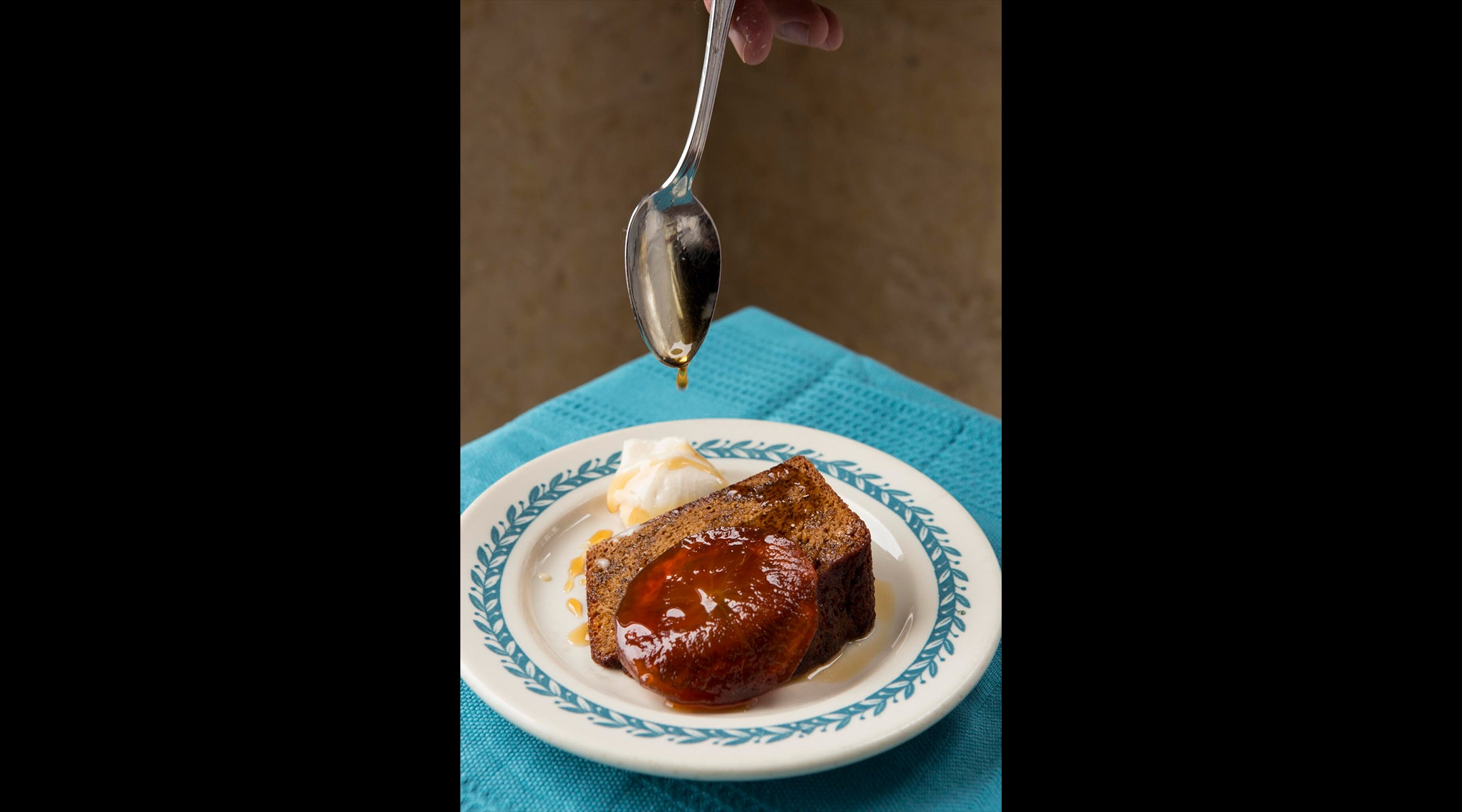
(Michael Persico)
Honey Cake with Apple Confit
Yields: 1 loaf
For the cake:
- 2 ½ cups all–purpose flour
- 2 heaping tsp baking soda
- 1 cup sugar
- ½ tsp salt
- pinch ground cinnamon
- 3 large eggs, lightly beaten
- 1 ¼ cups brewed coffee
- 2/3 cup honey
- 6 Tbsp canola oil
For the apple confit:
- 3 apples, peeled and sliced thinly crosswise
- 1 cup sugar
- 1 Tbsp honey
- 2 cinnamon sticks
- 1 vanilla bean, split
- 3 cloves
DIRECTIONS
- For the cake: Preheat the oven to 350 F. with a rack in the middle. Line two 5-by-9-inch loaf pans with oiled parchment paper. Combine the flour and baking soda in a bowl and whisk well.
- In a bowl of a stand mixer, combine the sugar, salt, cinnamon, eggs, coffee, honey and oil. Mix on low speed until blended. Add the flour mixture and continue mixing just until combined. Divide the batter evenly between the prepared loaf pans. Bake until a toothpick inserted in the center comes out clean, about 30 minutes. Decrease the oven temperature to 275 F.
- For the apples: Toss the apple slices with the sugar, honey, cinnamon, vanilla bean, and cloves. Arrange in a single layer in a large ovenproof skillet or a baking pan. Add enough water to just cover the apples. Press a sheet of parchment onto the surface of the water.
- Cover the skillet tightly with foil, bring to a simmer over medium-high heat, and transfer to the oven. Bake until the apples are just tender, about 1 hour. Cool to room temperature, transfer to a lidded container, and refrigerate until cold. Serve with the honey cake.
Dorie Greenspan
Dorie Greenspan, food writer and cookbook author, isn’t sure she will be preparing a holiday meal. But if she were, she knows exactly how she would end it: with Szarlotka, a Polish apple cake that straddles the divide between pie and crumble. The crust, she says, “is delicious,” the filling of apples and raisins are the flavors of Rosh Hashanah, for her.
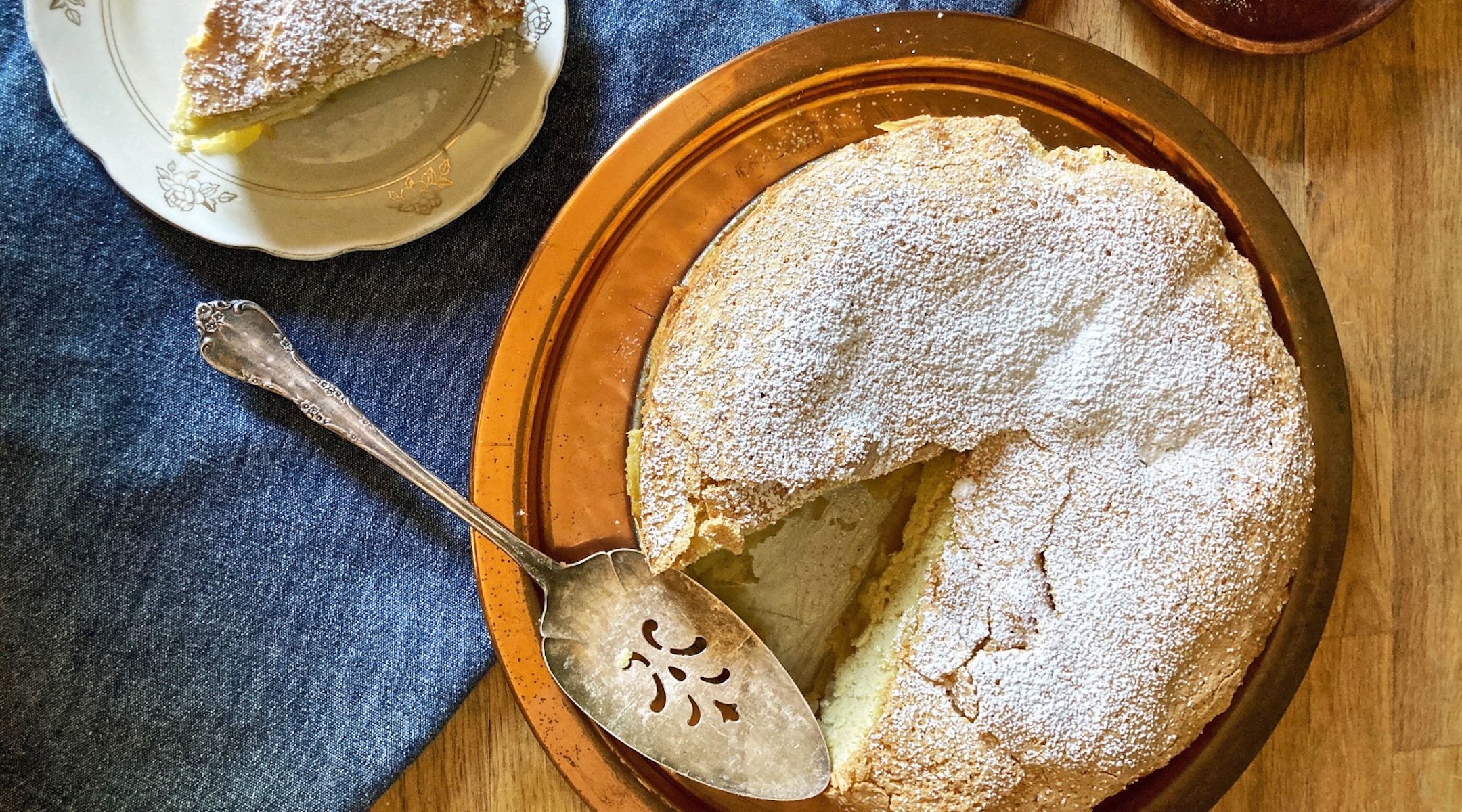
(Sonya Sanford)
Check out our easy, one-bowl recipe for apple Sharlotka by Nosher contributor Sonya Sanford here!
JTA has documented Jewish history in real-time for over a century. Keep our journalism strong by joining us in supporting independent, award-winning reporting.
